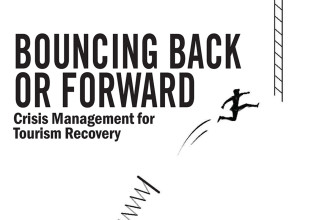
Two thirds of the global population is employed by MSMEs. In Nepal there are 31 lakh MSMEs registered with an additional 67.5% operating in the informal sector employing 17.5 lakh people.
Today, MSME’s are the hardest hit by the Covid 19 crisis. What can the MSME entrepreneur do to survive and recover from this crisis in the immediate time?
In this edition of Business 360, three personalities share their opinion on what the MSME entrepreneur could /should do in the current economic crisis brought on by the pandemic that threatens their existence?
 Crisis presents an opportunity for MSMEs to catch-up with the fast paced business world dominated by big business houses. It is also a chance for entrepreneurs to take a step back and look at things from a holistic perspective. Entrepreneurs can choose to follow either of these 4-action steps to survive and thrive the pandemic:
1. Collaborate – Instead of trying to do everything on their own, MSMEs can collaborate with each other in the ecosystem by partnering on key strategic fronts to save resources – time and money and to excel in business during and post pandemic. For example, a home-stay business in Helambu can partner with e-commerce startup in Pokhara on a revenue-sharing model that benefits both parties.
2. Pivot – Easier said than done but if the business is struggling to make ends’ meet during the pandemic and the post-pandemic situation does not look better either, it is best to pivot partially or completely to a new business model. For example, a restaurant with 50+ table with an average of 200 diners a day, might find it difficult to fill those tables post pandemic. Instead of closing down, it can leave the rental space and operate in a “cloud-kitchen,” lean model with delivery only option and manage to cater to 200+ diners a day.
Crisis presents an opportunity for MSMEs to catch-up with the fast paced business world dominated by big business houses. It is also a chance for entrepreneurs to take a step back and look at things from a holistic perspective. Entrepreneurs can choose to follow either of these 4-action steps to survive and thrive the pandemic:
1. Collaborate – Instead of trying to do everything on their own, MSMEs can collaborate with each other in the ecosystem by partnering on key strategic fronts to save resources – time and money and to excel in business during and post pandemic. For example, a home-stay business in Helambu can partner with e-commerce startup in Pokhara on a revenue-sharing model that benefits both parties.
2. Pivot – Easier said than done but if the business is struggling to make ends’ meet during the pandemic and the post-pandemic situation does not look better either, it is best to pivot partially or completely to a new business model. For example, a restaurant with 50+ table with an average of 200 diners a day, might find it difficult to fill those tables post pandemic. Instead of closing down, it can leave the rental space and operate in a “cloud-kitchen,” lean model with delivery only option and manage to cater to 200+ diners a day.
 Globally, Covid 19 has created multiple challenges and issues in every person’s life. Businesses are largely affected hence people one too with closure of businesses and loss of jobs. The pandemic has especially affected Micro, Small and Medium Enterprises (MSMEs) acutely. Personally, I have been observing entrepreneurs giving up hope of survival and feeling very vulnerable and depressive.
Nobody had ever imagined such uncertainty and sought solutions, let alone be prepared for the kind of resilience required. The only thing in the current time is the hope that this time shall pass soon. We can only stay positive and explore solutions.
In my opinion, there are three things that entrepreneurs can do in this point of time. Adapt with the situation, adjust to the new normal - give innovation to your product, services and procedures - and thereby find ways to give continuity to your business.
Globally, Covid 19 has created multiple challenges and issues in every person’s life. Businesses are largely affected hence people one too with closure of businesses and loss of jobs. The pandemic has especially affected Micro, Small and Medium Enterprises (MSMEs) acutely. Personally, I have been observing entrepreneurs giving up hope of survival and feeling very vulnerable and depressive.
Nobody had ever imagined such uncertainty and sought solutions, let alone be prepared for the kind of resilience required. The only thing in the current time is the hope that this time shall pass soon. We can only stay positive and explore solutions.
In my opinion, there are three things that entrepreneurs can do in this point of time. Adapt with the situation, adjust to the new normal - give innovation to your product, services and procedures - and thereby find ways to give continuity to your business.
 That the Covid 19 pandemic has affected the entrepreneurial ecosystem of Nepal would be an understatement to its real impact on micro, small, and medium-sized enterprises, their value chain, and their business models. Since 2015 enterprises in Nepal have faced serious external crises like the Gorkha earthquake, economic blockade, other natural disasters, and two lengthy periods of lockdown. While many entrepreneurs have shut their businesses, the ones that are surviving are thin stretched in terms of resources as rainy day funds required to keep their businesses afloat has become a luxury for MSME. Under these circumstances, MSMEs should prioritise two strategic directions: surviving today and thriving tomorrow.
Surviving Today - The Reactive Mode: First and foremost, take care of your team. Your team is the most important asset in your organisation. Coming together and showing compassion is the first step towards beating this crisis. Check-in with them regularly, try to empathise with the hardships they are going through in their personal life and create mechanisms to bring the human side of the organisation alive including activities like happy hour, and check-in sessions to see how team members are doing mentally, emotionally, and spiritually.
Retaining your key team members is challenging at this time. They might be working more because they love their work and their company. Due to the ongoing crisis, you might not be able to pay them their entire salary. It is important for you to revisit your costs and prioritise salary payments. If you are still not able to pay salaries, communicate it clearly with your staff. Let them know that the company will take care of the deficits when it bounces back. That commitment would be important. It is helpful if you can set up an employee team to seek solutions to these challenges.
Communicate with your other important stakeholders like customers, investors, bankers transparently. They know that the world is on a life-saving mode right now. Hiding it from them would only distance potential help while allowing rumors to spread. Set up mechanisms to communicate with those stakeholders constantly and update them about developments.
Revisit your budgets and take necessary measures to cut costs. Crises like pandemic and recessions are not for business development. Reassessing the need for every line item in your budget should help you free up additional resources that can act as “rainy day funds” (reserves). Requesting payment deferrals, deferring partial payments of salaries, approaching financial institutions for overdrafts and short-term loans, and keeping tabs on government welfare packages are some strategies that might help your cause.
You might also want to use this time to reassess your organisation’s systems, develop procedures, document organisational history, practice processes for efficiency and transform your organisational efficiency as you wait for the economy to bounce back. Engaging in corporate social responsibility projects, in a minimally invasive manner, would be another desirable strategy that could enhance your good will. It’s important to note that these are desirable actions which have their own unique resource constraints. Assess whether you can afford to do it.
That the Covid 19 pandemic has affected the entrepreneurial ecosystem of Nepal would be an understatement to its real impact on micro, small, and medium-sized enterprises, their value chain, and their business models. Since 2015 enterprises in Nepal have faced serious external crises like the Gorkha earthquake, economic blockade, other natural disasters, and two lengthy periods of lockdown. While many entrepreneurs have shut their businesses, the ones that are surviving are thin stretched in terms of resources as rainy day funds required to keep their businesses afloat has become a luxury for MSME. Under these circumstances, MSMEs should prioritise two strategic directions: surviving today and thriving tomorrow.
Surviving Today - The Reactive Mode: First and foremost, take care of your team. Your team is the most important asset in your organisation. Coming together and showing compassion is the first step towards beating this crisis. Check-in with them regularly, try to empathise with the hardships they are going through in their personal life and create mechanisms to bring the human side of the organisation alive including activities like happy hour, and check-in sessions to see how team members are doing mentally, emotionally, and spiritually.
Retaining your key team members is challenging at this time. They might be working more because they love their work and their company. Due to the ongoing crisis, you might not be able to pay them their entire salary. It is important for you to revisit your costs and prioritise salary payments. If you are still not able to pay salaries, communicate it clearly with your staff. Let them know that the company will take care of the deficits when it bounces back. That commitment would be important. It is helpful if you can set up an employee team to seek solutions to these challenges.
Communicate with your other important stakeholders like customers, investors, bankers transparently. They know that the world is on a life-saving mode right now. Hiding it from them would only distance potential help while allowing rumors to spread. Set up mechanisms to communicate with those stakeholders constantly and update them about developments.
Revisit your budgets and take necessary measures to cut costs. Crises like pandemic and recessions are not for business development. Reassessing the need for every line item in your budget should help you free up additional resources that can act as “rainy day funds” (reserves). Requesting payment deferrals, deferring partial payments of salaries, approaching financial institutions for overdrafts and short-term loans, and keeping tabs on government welfare packages are some strategies that might help your cause.
You might also want to use this time to reassess your organisation’s systems, develop procedures, document organisational history, practice processes for efficiency and transform your organisational efficiency as you wait for the economy to bounce back. Engaging in corporate social responsibility projects, in a minimally invasive manner, would be another desirable strategy that could enhance your good will. It’s important to note that these are desirable actions which have their own unique resource constraints. Assess whether you can afford to do it.
Amun Thapa Fouder & CEO, Sastodeal
 Crisis presents an opportunity for MSMEs to catch-up with the fast paced business world dominated by big business houses. It is also a chance for entrepreneurs to take a step back and look at things from a holistic perspective. Entrepreneurs can choose to follow either of these 4-action steps to survive and thrive the pandemic:
1. Collaborate – Instead of trying to do everything on their own, MSMEs can collaborate with each other in the ecosystem by partnering on key strategic fronts to save resources – time and money and to excel in business during and post pandemic. For example, a home-stay business in Helambu can partner with e-commerce startup in Pokhara on a revenue-sharing model that benefits both parties.
2. Pivot – Easier said than done but if the business is struggling to make ends’ meet during the pandemic and the post-pandemic situation does not look better either, it is best to pivot partially or completely to a new business model. For example, a restaurant with 50+ table with an average of 200 diners a day, might find it difficult to fill those tables post pandemic. Instead of closing down, it can leave the rental space and operate in a “cloud-kitchen,” lean model with delivery only option and manage to cater to 200+ diners a day.
Crisis presents an opportunity for MSMEs to catch-up with the fast paced business world dominated by big business houses. It is also a chance for entrepreneurs to take a step back and look at things from a holistic perspective. Entrepreneurs can choose to follow either of these 4-action steps to survive and thrive the pandemic:
1. Collaborate – Instead of trying to do everything on their own, MSMEs can collaborate with each other in the ecosystem by partnering on key strategic fronts to save resources – time and money and to excel in business during and post pandemic. For example, a home-stay business in Helambu can partner with e-commerce startup in Pokhara on a revenue-sharing model that benefits both parties.
2. Pivot – Easier said than done but if the business is struggling to make ends’ meet during the pandemic and the post-pandemic situation does not look better either, it is best to pivot partially or completely to a new business model. For example, a restaurant with 50+ table with an average of 200 diners a day, might find it difficult to fill those tables post pandemic. Instead of closing down, it can leave the rental space and operate in a “cloud-kitchen,” lean model with delivery only option and manage to cater to 200+ diners a day.
After every major crisis comes a period of immense growth and opportunities. It’s a simple business cycle – recession is followed by expansion and the cycle repeats. Post-pandemic, billions of people will be looking to change habits, millions of people will be looking for jobs, thousands of new businesses and ideas will emerge. Where will you be in all of these?3. Wait – Like time heals everything, it will heal your business and industry too. If you have the patience to wait at least 6-12 months, save up your resources, use the time to learn new skills in the domain, and resume once the sky is clear. 4. Gamble – If business history tells us one thing – it is that companies that have made fortunes today are the ones who have doubled-down in crisis where others have backed out. If you are even 50% confident that crisis is temporary and things will go back to normal anytime soon, then this is your time to take risks, invest in growth drivers and when things go back to normal, be aggressive enough to seize the opportunities. After every major crisis comes a period of immense growth and opportunities. It’s a simple business cycle – recession is followed by expansion and the cycle repeats. Post-pandemic, billions of people will be looking to change habits, millions of people will be looking for jobs, thousands of new businesses and ideas will emerge. Where will you be in all of these?
Niraj Khanal CEO, Antarprerana
 Globally, Covid 19 has created multiple challenges and issues in every person’s life. Businesses are largely affected hence people one too with closure of businesses and loss of jobs. The pandemic has especially affected Micro, Small and Medium Enterprises (MSMEs) acutely. Personally, I have been observing entrepreneurs giving up hope of survival and feeling very vulnerable and depressive.
Nobody had ever imagined such uncertainty and sought solutions, let alone be prepared for the kind of resilience required. The only thing in the current time is the hope that this time shall pass soon. We can only stay positive and explore solutions.
In my opinion, there are three things that entrepreneurs can do in this point of time. Adapt with the situation, adjust to the new normal - give innovation to your product, services and procedures - and thereby find ways to give continuity to your business.
Globally, Covid 19 has created multiple challenges and issues in every person’s life. Businesses are largely affected hence people one too with closure of businesses and loss of jobs. The pandemic has especially affected Micro, Small and Medium Enterprises (MSMEs) acutely. Personally, I have been observing entrepreneurs giving up hope of survival and feeling very vulnerable and depressive.
Nobody had ever imagined such uncertainty and sought solutions, let alone be prepared for the kind of resilience required. The only thing in the current time is the hope that this time shall pass soon. We can only stay positive and explore solutions.
In my opinion, there are three things that entrepreneurs can do in this point of time. Adapt with the situation, adjust to the new normal - give innovation to your product, services and procedures - and thereby find ways to give continuity to your business.
Adaption
Try to stay positive, entertain yourself, concentrate on work that you enjoy the most, do physical and mental exercises, eat healthy and pursue your hobbies. Importantly make your family to do the same. Keep yourself busy and occupied. Remember if you and your family are not fit, your business will not be fit. I have observed that when the owner of the company is unwell, the business is bound to slow down or sometimes come to complete stop as most of the Nepali companies are owner driven rather than system driven. Do not spend too much time on social media. Do not over-think your business. Do not spend time on issues and matters that you cannot control like talking about politics. Rather invest in increasing your knowledge and skills, eg: join webinars. Focus on team: Spend time with your partners and team online. Talk with them on a frequent basis to ask about their wellbeing and stay engaged. Support them. Your priority rather than focusing on social work, should be to rescue your people before rescuing others. Working from home in the context of our social culture is not that easy. Provide flexible working hours. Eliminate unnecessary online meetings. Empathise with your team members, you need them the most. Reach out to customers through digital mediums even though you are not serving them right now. Make yourself visible be through social media platforms. Stay connected! InnovationOwn the solution as much as you own the problem. Find a good mentor who can guide you. But remember you are on your own. You need to harness your skills and resources as best possible yourself.Revisit your vision, goals and targets Remember, while starting your business you probably had thought that you know everything there is to know about your business ideas and that eventually you would make huge profits, which for most of us didn’t happen. Now that you have the time to reflect, you will probably have realised that you were not as prepared. But at this point of time we must learn and evolve from the many mistakes we have made, the changes in government policies, our experience coming through natural disasters and calamites. This is the time for introspection: to try to find answers to the purpose of your life. Try to evaluate your strengths and weaknesses. Make a list of lessons: your failures and best practices. Based on your ‘WHY’ i.e, your purpose of life, your individual strengths, the needs of your customer, define your new value proposition and set new goals and strategies with innovation. Iterate your product, services and processes. Let go of methods that were not working too well. The channels you were using to reach your customers might not be working as well as you think, innovate and collaborate to increase your outreach. Think digital. Modify your work culture and systems.
Business continuity
Go for the lean approach again. Do a lot of experimentation to give the best solution to your customers. You may fail initially but remember to “fail fast, fail cheap, fail often” – yet to be determined to continue your business. Steve Blank once said “Get out of the building” - it is not literally out of the building, it’s about getting your hands dirty! Don’t expect others to help you. Help yourself, try to solve your problems. Own the solution as much as you own the problem. Find a good mentor who can guide you. But remember you are on your own. You need to harness your skills and resources as best possible yourself.Narottam Aryal President, King’s College
 That the Covid 19 pandemic has affected the entrepreneurial ecosystem of Nepal would be an understatement to its real impact on micro, small, and medium-sized enterprises, their value chain, and their business models. Since 2015 enterprises in Nepal have faced serious external crises like the Gorkha earthquake, economic blockade, other natural disasters, and two lengthy periods of lockdown. While many entrepreneurs have shut their businesses, the ones that are surviving are thin stretched in terms of resources as rainy day funds required to keep their businesses afloat has become a luxury for MSME. Under these circumstances, MSMEs should prioritise two strategic directions: surviving today and thriving tomorrow.
Surviving Today - The Reactive Mode: First and foremost, take care of your team. Your team is the most important asset in your organisation. Coming together and showing compassion is the first step towards beating this crisis. Check-in with them regularly, try to empathise with the hardships they are going through in their personal life and create mechanisms to bring the human side of the organisation alive including activities like happy hour, and check-in sessions to see how team members are doing mentally, emotionally, and spiritually.
Retaining your key team members is challenging at this time. They might be working more because they love their work and their company. Due to the ongoing crisis, you might not be able to pay them their entire salary. It is important for you to revisit your costs and prioritise salary payments. If you are still not able to pay salaries, communicate it clearly with your staff. Let them know that the company will take care of the deficits when it bounces back. That commitment would be important. It is helpful if you can set up an employee team to seek solutions to these challenges.
Communicate with your other important stakeholders like customers, investors, bankers transparently. They know that the world is on a life-saving mode right now. Hiding it from them would only distance potential help while allowing rumors to spread. Set up mechanisms to communicate with those stakeholders constantly and update them about developments.
Revisit your budgets and take necessary measures to cut costs. Crises like pandemic and recessions are not for business development. Reassessing the need for every line item in your budget should help you free up additional resources that can act as “rainy day funds” (reserves). Requesting payment deferrals, deferring partial payments of salaries, approaching financial institutions for overdrafts and short-term loans, and keeping tabs on government welfare packages are some strategies that might help your cause.
You might also want to use this time to reassess your organisation’s systems, develop procedures, document organisational history, practice processes for efficiency and transform your organisational efficiency as you wait for the economy to bounce back. Engaging in corporate social responsibility projects, in a minimally invasive manner, would be another desirable strategy that could enhance your good will. It’s important to note that these are desirable actions which have their own unique resource constraints. Assess whether you can afford to do it.
That the Covid 19 pandemic has affected the entrepreneurial ecosystem of Nepal would be an understatement to its real impact on micro, small, and medium-sized enterprises, their value chain, and their business models. Since 2015 enterprises in Nepal have faced serious external crises like the Gorkha earthquake, economic blockade, other natural disasters, and two lengthy periods of lockdown. While many entrepreneurs have shut their businesses, the ones that are surviving are thin stretched in terms of resources as rainy day funds required to keep their businesses afloat has become a luxury for MSME. Under these circumstances, MSMEs should prioritise two strategic directions: surviving today and thriving tomorrow.
Surviving Today - The Reactive Mode: First and foremost, take care of your team. Your team is the most important asset in your organisation. Coming together and showing compassion is the first step towards beating this crisis. Check-in with them regularly, try to empathise with the hardships they are going through in their personal life and create mechanisms to bring the human side of the organisation alive including activities like happy hour, and check-in sessions to see how team members are doing mentally, emotionally, and spiritually.
Retaining your key team members is challenging at this time. They might be working more because they love their work and their company. Due to the ongoing crisis, you might not be able to pay them their entire salary. It is important for you to revisit your costs and prioritise salary payments. If you are still not able to pay salaries, communicate it clearly with your staff. Let them know that the company will take care of the deficits when it bounces back. That commitment would be important. It is helpful if you can set up an employee team to seek solutions to these challenges.
Communicate with your other important stakeholders like customers, investors, bankers transparently. They know that the world is on a life-saving mode right now. Hiding it from them would only distance potential help while allowing rumors to spread. Set up mechanisms to communicate with those stakeholders constantly and update them about developments.
Revisit your budgets and take necessary measures to cut costs. Crises like pandemic and recessions are not for business development. Reassessing the need for every line item in your budget should help you free up additional resources that can act as “rainy day funds” (reserves). Requesting payment deferrals, deferring partial payments of salaries, approaching financial institutions for overdrafts and short-term loans, and keeping tabs on government welfare packages are some strategies that might help your cause.
You might also want to use this time to reassess your organisation’s systems, develop procedures, document organisational history, practice processes for efficiency and transform your organisational efficiency as you wait for the economy to bounce back. Engaging in corporate social responsibility projects, in a minimally invasive manner, would be another desirable strategy that could enhance your good will. It’s important to note that these are desirable actions which have their own unique resource constraints. Assess whether you can afford to do it.
Retaining your key team members is challenging at this time. They might be working more because they love their work and their company. Due to the ongoing crisis, you might not be able to pay them their entire salary. It is important for you to revisit your costs and prioritise salary payments.Thriving Tomorrow - The Reactive Mode: It might just be the right time to transform your organisational culture into a proactive strategic thinking culture. Some of the activities you could engage in include setting up cross-functional teams to discuss your organisation’s future, brainstorm new ideas, and prepare for future opportunities like developing branding elements that express the credibility/impact of your organisation’s work that you could potentially use in your next grant or investment cycle. On one hand, these activities are strategic, on the other, they provide hope to your employees. However, you want to be mindful of not draining the organisation’s resources away from its priority areas like production and sales. To sum it up, balancing between exploration and exploitation would be the key to survive amidst this crisis while preparing for a brighter future. The challenges might be overwhelming for MSMEs more than any other enterprises. Please understand that this is just another phase and it will pass. Being extra vigilant on your resources and strategies can help you survive.
Published Date: June 30, 2021, 12:00 am
Post Comment
E-Magazine
RELATED Opinion





